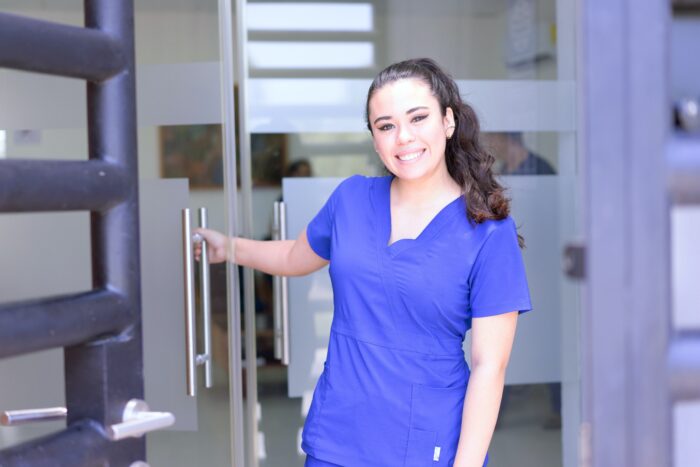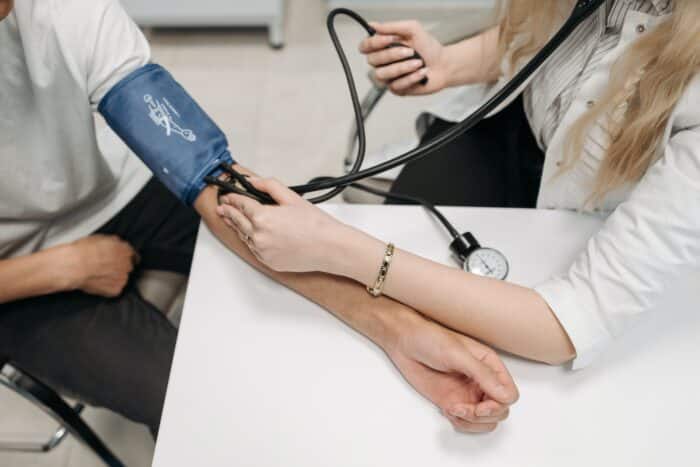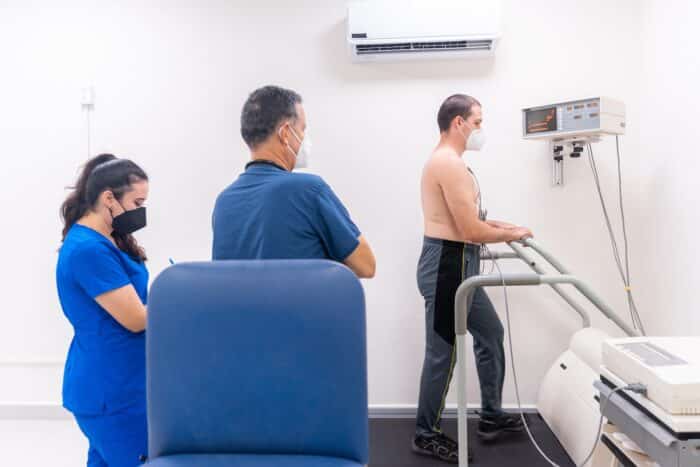If you want to step foot in the healthcare industry and don’t know which career to start with, medical assistance might be the best career for you.
Why is medical assistance considered the best entry point into the healthcare industry?
Because you do not need a degree to become a medical assistant.
Yes, you read that right. Medical assistants are healthcare workers who provide support services to healthcare professionals, which may include both clinical and administrative tasks.
The only minimum requirement to become a medical assistant is to earn your high school diploma or a GED, which is why it is considered one of the best careers.
Medical assistants can also work under specialized healthcare professionals, such as cardiologists.
Cardiologists are healthcare professionals who deal with the disorders of the heart. Cardiology medical assistants work in close proximity to cardiologists and perform tasks required by healthcare professionals.
Read on to find out everything you will need to know about cardiology medical assistants, what they do, where can medical assistants work, how much they earn, and how to become a medical assistant.
Also read: Is Medical Assistant a Good Career?
What is a Cardiology Medical Assistant?
Cardiology medical assistants are healthcare workers who assist cardiologists with both clinical and administrative tasks. Their main goal is to deliver care for patients with heart disorders or diseases.
In most cases, cardiology patients are long-term patients who need regular care. Hence, medical assistants working in this field tend to have an opportunity to build long-term relationships with their patients.
Read more on What is a Medical Assistant?
What Does a Cardiology Medical Assistant Do?
As mentioned earlier, cardiology medical assistants help cardiologists with clinical and administrative work around the hospital or office. Their duties can range from scheduling appointments to assisting cardiologists with examinations.
Let us take a deeper look at some of the main duties of a cardiology medical assistant-
Clinical Duties
- Prepping examination rooms-
Cardiology medical assistants, much like regular medical assistants, are required to prepare the examination rooms both before and after each patient visit. They are also needed to guide the patients to the examination rooms and instruct them on the upcoming procedure. - Collecting samples-
Medical assistants are often required to collect samples for further analysis; therefore, they should be comfortable dealing with pieces such as urine, blood, and stool. More often than not, cardiology medical assistants are also required to draw patients’ blood for testing; hence, they should have good phlebotomy skills.
Also see: Can Medical Assistants Draw Blood?
- Recording and maintaining vital signs-
One of the most common duties of all medical assistants is to measure and record patients’ vital signs. This is especially useful in cardiology, as recording the heart rate and blood pressure can help diagnose almost any disorder. - Performing ECG-
An ECG or EKG (Electrocardiogram) is a test that is used to test and record any irregularities in the heart rhythm of the patient. A cardiology medical assistant should be familiar with the handling and maintenance of this test.
Administrative Duties
- Answering calls-
Medical assistants are considered the face of any clinic or hospital since they are usually the first point of contact for patients. Cardiology medical assistants are required to answer any queries or help patients refill their prescribed medications efficiently over calls. - Handling payments-
Medical assistants are also required to handle the most common administrative task: assist patients with billings and payments and help them with insurance claims. - Scheduling appointments-
Also, one of the most common tasks of medical assistants they are not only responsible for scheduling appointments but also need to ensure that the schedule of the entire office or hospital is running smoothly.
Also read: Medical Assistant Job Duties
Where Do Cardiology Medical Assistants Work?
Cardiology medical assistants generally work in specialized clinics or hospitals dedicated to cardiology.
Medical assistants working in the field of cardiology typically work in two types of settings, a clinic or a hospital. Both these settings consist of some differences in their working hours,
for instance, while working in a hospital may entail nights and weekends, working in a clinic typically involves working during regular business hours.
In both cases, medical assistants work in a fast-paced workplace that necessitates a lot of physical labor in any location.
What Skills & Qualifications Does a Cardiology Medical Assistant Need?
Along with the standard medical assistant skills, such as medical helping, cardiology medical assistants may also require additional specialized abilities, such as:
- Certification for EKG-
The ability to read and handle EKG tests is one of the most important skills a medical assistant in cardiology needs. A specialized certification program might be necessary for this. - Knowledge of the basic jargon used in medicine-
To have an efficient conversation with the patients and to be able to relay all information to the physician, medical assistants need to have a fundamental comprehension of the basic medical jargon, just like the rest of the healthcare team. - Organizational skills-
Medical assistants need to be extremely organized since they often multitask and perform tasks such as recording vital signs, handling billing, and maintaining stock levels of supplies. - Customer support-
During a patient’s visit to the clinic, a medical assistant is usually the first and last person they encounter. During appointments, it’s critical to make patients feel welcomed and taken care of. - Physical agility-
In addition to assisting physicians with bedside procedures, medical assistants often have to handle medical devices. It’s, therefore, important for them to have high manual dexterity and hand-eye coordination. - Computer literacy-
A significant part of medical care is accurate documentation of patient’s medical histories, billing, payments, and other data. Important data may be lost if computer systems are not properly understood. Medical assistants are therefore required to have basic computer skills. - Attention to detail-
It’s important to recognize minute details or irregularities within a patient’s readings and to know when to alert a manager to them. A patient may require urgent care if their vital signs or skin color change.
Salaries and Job Prospects for Cardiology Medical Assistants
The average yearly wage for medical assistants in the country is about $37,000, or $18 per hour, as reported by the U.S. Bureau of Labour Statistics (BLS). This varies depending on your place of employment, experience, credentials, and specialty field.
Medical assistants in the field of cardiology typically start off making between $18 and $20 per hour. Additionally, many job postings for medical assistants in cardiology advertise sign-on bonuses of up to $4,000.
However, it is important to note that this data has been pulled from job-board sites such as glassdoor.com since there was no government data available for cardiology medical assistants specifically.
The BLS also reported a 16% growth in medical assistant job possibilities between 2021 and 2031, which is far more than any other profession.
This makes this an ideal career with a highly positive medical assistant job outlook.
Read more on Certified Medical Assistant Salary

Do You Want To Become a Medical Assistant? Check Out Free Medical Assistant Masterclass!
In our masterclass you learn:
- How to be a medical assistant faster…in just 4 months!
- Avoid student debt & driving to classes
- #1 thing employers want from Medical Assistants
- How to stand-apart & get a university certificate for a strong resume
How To Become a Cardiology Medical Assistant?
Becoming a cardiology medical assistant is actually similar to becoming a regular medical assistant. You should also note that even though a degree is not required to become a medical assistant, employers highly prefer candidates who earn certifications.
Here is how to become a medical assistant–
1. Complete your high school diploma or a GED
Although becoming a medical assistant does not require a degree, the minimum requirement is to complete your high school diploma or a GED.
2. Get medical assistant training
Most employers prefer candidates who undertake medical assistance training, as this helps you gain the necessary skills to perform the day-to-day tasks. This is not necessary for most states but is highly recommended.
There are three main methods of getting your medical assistant training, getting an associate’s degree from a technical university, getting a diploma from a community college, or completing an online training program.
Read more on: Medical Assistant Degree vs Certificate
Completing your training through online medical assistant programs is the most recommended, as it offers several advantages over other methods, such as:
- It allows you to complete your training much faster, in as little as 6 months
- Allows you to learn at your own pace and time schedule and from the comfort of your own home
- Costs much less than its alternatives (See: Medical Assistant Programs Cost)
Also see: Is Medical Assistant Degree Required?
3. Apply for Externships
If you opt for online training programs, they usually offer externship opportunities after you finish your course. However, you can also choose to apply for externships at companies you have shortlisted on your own. An externship is considered necessary as it provides you with the essential hands-on job training that will help you step foot into the workforce smoothly.
See: Accelerated Medical Assistant Program
4. Get Certified
Although not necessary, employers highly prefer candidates who obtain their certifications, which implies that they have the necessary skills and educational competence to handle the responsibilities of a medical assistant.
There are many types of certifications available for medical assistants, however, the most prominent and well-accepted ones are the CCMA, RMA, and CMA certifications.
Read more on Which Medical Assistant Certification is the Best?
5. Apply for jobs
Now that you’re a certified medical assistant, specializing in cardiology, you can start applying for jobs in the type of work setting that is best suited for you.
Also see: Medical Assistant Certificate Requirements
Conclusion
In conclusion, a cardiology medical assistant is a vital part of heart health care. They assist cardiologists during exams, help with tests, manage records, and offer important aid to both medical teams and patients. Their dedication significantly contributes to excellent heart care, making them key players in promoting heart wellness and ensuring a positive experience for patients in cardiology settings.
See Other Types of Medical Assistants:
- Ophthalmic Medical Assistant
- Pediatric Medical Assistant
- Podiatric Medical Assistant
- Dermatology Medical Assistant
- Military Medical Assistant
Related Resources:
- How Long Does It Take To Become a Medical Assistant
- CMA vs CNA
- CMAA vs CCMA
- Is Medical Assistant School Hard?
- Medical Assistant On-the-Job Training
- Medical Assistant vs EMT
- 12 Reasons to Become a Medical Assistant
- National Certified Medical Assistant NCMA
- Certified Medical Assistant
- Cheapest Medical Assistant Program
Related Articles
-
How to Be Successful in College in 2022 – 7 Simple Tips to Succeed
-
How Do Scholarships Work? Read This First…Truth is Shocking
-
7 Best College Majors 2024: What Should I Major In?
-
How to Choose a College – 10 Things You Must Consider in 2024
-
Why Go to College? Top 13 Benefits for Adult Students in 2022
-
Top 5 Best Alternatives to Community College for 2024








